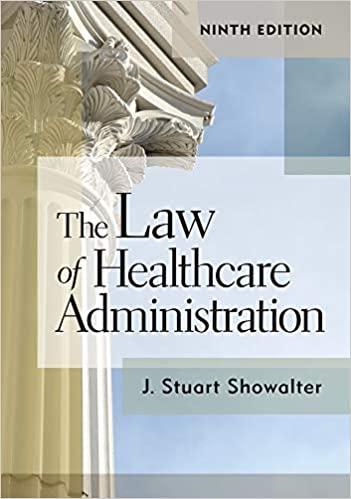Question
TRUE/FALSE Circle the Correct Choice Mary Midgley is a cultural relativist. T/F Ethics defines norms in terms that are universalizable. T/F Intrinsic values matter because
| TRUE/FALSE Circle the Correct Choice
MUTIPLE-CHOICE QUESTIONS - Circle the Correct letter 1. Eudaimonism is a name given to ethical theories holding that: a.Moral norms are just expressions of emotion b. The ethical life leads to happiness c, Demonic violence is to be rejected d. The ethical life preserves a "good will" 2. Socrates agreed with the Oracle of Delphi's statement that he was the "wisest of men," only because: a. He used "Elenchus" in his arguments b. He had a snub nose and did not mind c. He boldly corrupted the youth of Athens and did not deny it d. He at least knew that "he did not know" 3. Ethics does NOT include which one of the following: a. Professional codes of responsibility b. Academic discipline c.Tribal instincts d. Evaluation of what it means to act and act well 4. Shirley Jackson's short story, "The Lottery," implies what about Fairness? a. It flows from unquestioning social cohesion b. It requires us to take it like a "grown up" when we lose c. It is only possible when we give priority to knowing the truth over adhering blindly toreceived traditions d. It is reinforced by the fellow feeling of town events like barbecues and scouting holidays 5. The Method of Ethics has parallels to all but which of the following: a. The method of natural science b. The method of acing the stock market c. The method of setting out priorities in a "TO DO" list d. The Method of staying on track and avoiding distractions 6. Submitting to normative demands imposed by another without affirming them independently is termed: a. Elenchus b. Communitarianism c. A pledge d. Heteronomy 7. Aquinas holds that acting ethically leads to: a. Possessing a good will b. Functioning well according to one's nature c. The happiness of friendship d. The greatest happiness of all 8. Ethical statements are: a. Universalizable b. Normative' c. Impartial d, All the above 9. Ethics is concerned with justifying a. Behavior b. Action c. Wealth d. Self-Esteem 10. Edmund Burke thought that the French Revolution showed: a. That Ethics can bring about progressive change b. That abstract ethical principles are dangerous c. That the guillotine cost the French King more than his life. d. That harmless gossip may not be so harmless in the wrong hands. 11. Synderesis is: a. Habitual knowledge of first principles of right and wrong b. key step in the dialectic of the Socratic dialogue c. Irony d. Systematic ethical thought 12. Socrates would agree with which of the following statements: a. Piety is what the gods love b. The gods love what is pious c. The gods agree about concrete cases but not about principle d. Euthyphro is a wise man 13. Immanuel Kant thought that: a. To act ethically guarantees that one will be happy b. To act ethically is to be worthy of happiness c. Traits of good character ensure that one will act ethically d. Ethics conduces to the greatest happiness of all. 14. The "Necessity" Defense calls for a not guilty verdict, when: a. Poverty was the cause of the crime b. The strength of passion was overwhelming c, Committing the crime was unavoidably necessary to avoid great harm d. A calculation of costs and benefits proves the crime was useful 15. Ethics begins with some principles that are self-evident. These self-evident principles are sometimes termed: a. Lucky hunches b. Gambles c. Higher priorities d. Intuitions 16. Ethics assumes that its reason for action outweigh a. Good reasons b. Principles of logic c. Requirements of law d. Normative judgments 17. Ethics requires that pre-existing moral codes be: a. Rejected out of hand b. Strongly discounted c. Endorsed and defended d. Critically evaluated 18. Plato thought that to act ethically leads to: a. The avoidance of punishment in the afterlife b. Wealth and prosperity c. A well-functioning ego d. Elevation as a philosopher king 19. Communitarians view the Ethics of Individual Autonomy as: a. Making one worthy of happiness b. A mask for pragmatic preferences c. Opposed to Enlightenment values d. The culmination of the Socratic ideal 20. Ethics insists on being accorded: a. A comprehensive scope b. Preferential treatment as an academic discipline c. Superiority to the empirical sciences d. Freedom to force social change 21. Ethics favors cognition over: a. Emotion b. Vested interests c. Loyalties d. All the above 22. The Socratic dialogue relies on irony when it: a. Ends in perplexity b. Takes an initial claim seriously c. Exposes error d. Runs circles around the opponent 23. When Ethics discovers conflicting principles in one's settled assumptions, a. Reminds us that "a foolish consistency is the hobgoblin of little minds b. Cultivates the wisdom of knowing the difference and learning to live with it c. Confronts the conflict, understands it, and resolves it in favor of consistency d. Gnaws on it, like a dog on a bone 24. Emotivism treats the normative conclusions of Ethics: a. As no more than emotional responses b. Motivational incentives c. Respect for mind in harmony with body d. The whining of a petulant child END OF QUIZ | |
Due Date | |
| Sep 12, 2022 12:00 PM |
Submit Assignment
Files to submit | |
Comments | |
Step by Step Solution
There are 3 Steps involved in it
Step: 1

Get Instant Access to Expert-Tailored Solutions
See step-by-step solutions with expert insights and AI powered tools for academic success
Step: 2

Step: 3

Ace Your Homework with AI
Get the answers you need in no time with our AI-driven, step-by-step assistance
Get Started


